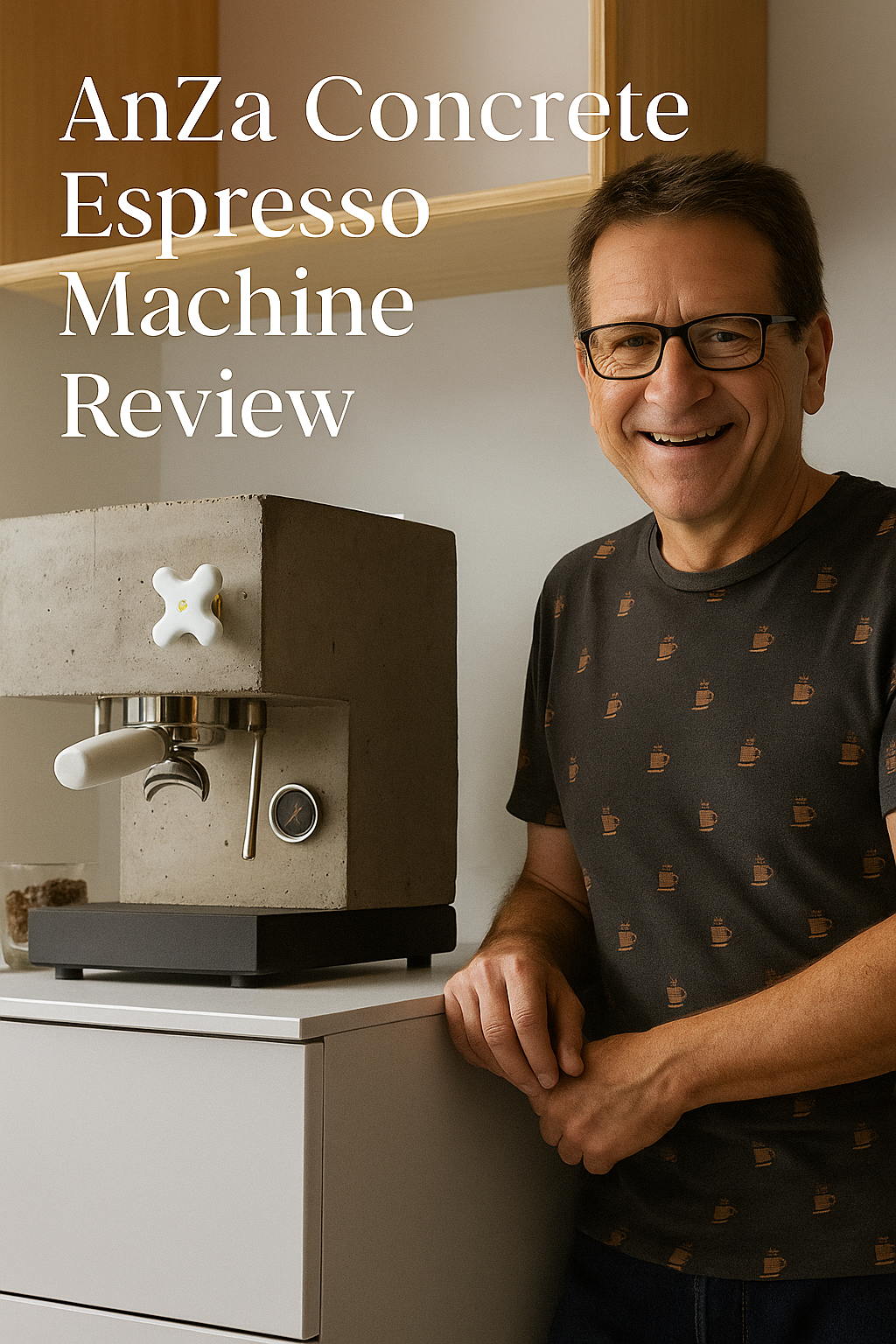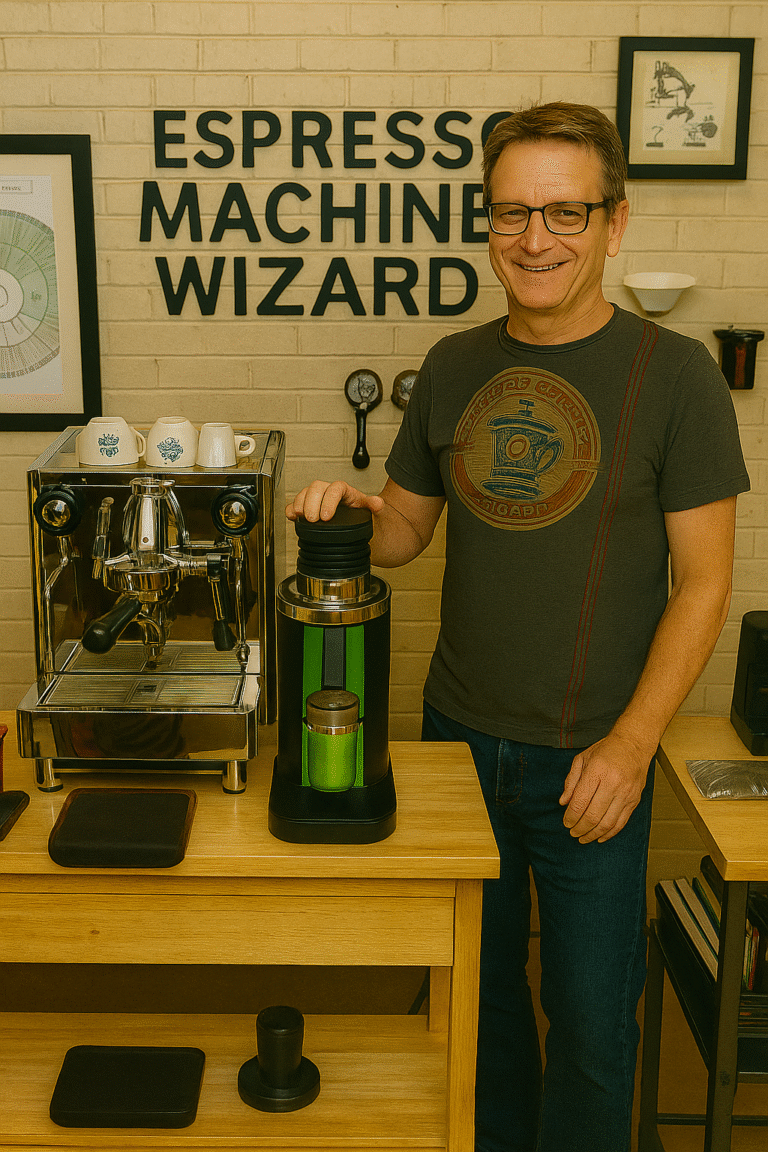AnZa Concrete Espresso Machine Review By Kevin Marshal
There are espresso machines that work. Some machines look attractive. Then there’s the AnZa Concrete Espresso Machine, which is a rare type of machine that combines industrial design with real espresso-making skill. If you’re not sure if this beauty is worth the extra money, if it brews as boldly as it looks, and if it belongs on your kitchen counter or in a modern art gallery, this in-depth review is for you.
I have worked with everything from single boilers that are good for home use to high-end commercial beasts. I’ve never seen anything like the AnZa. Not only does this machine make coffee, but it also makes a statement.
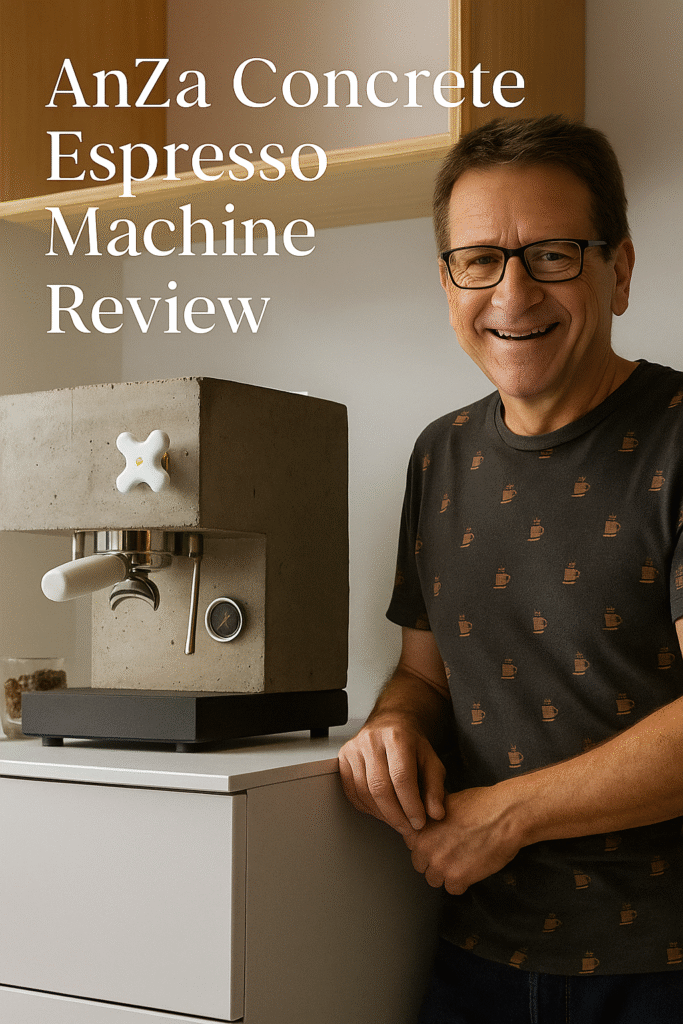
Table of Contents
- Overview: AnZa Concrete Espresso
- Quick Specs:
- First Impressions: Not Just a Machine, But a Sculpture
- Performance: More Than Just Good Looks
- Quality of the Espresso
- Power of the Steam Wand
- Usability and Workflow
- Pros of AnZa Espresso Machine:
- Cons of AnZa Concrete Machine:
- Who Should Buy the AnZa Concrete?
- Comparison: AnZa Concrete Vs Breville Barista Vs Rancilio Silvia Vs La Marzocco Linea Mini
- Kevin’s Final Decision – Is It Worth It?
- Questions and Answers:
- 1) Is it hard to clean the AnZa Concrete?
- 2) Can I use the AnZa with pods or capsules?
- 3) Is it easy for beginners to use?
- 4) How long does it take to get warm?
- 5) Are there other materials that the AnZa can be made from?
Overview: AnZa Concrete Espresso
The AnZa Concrete was made in California by Montaag and is not your typical espresso machine. It was made with carefully chosen “raw materials” like concrete, brass, wood, porcelain, and glass that are good for both form and function.
But don’t think that this tough look is new. It’s a powerful semi-automatic machine inside that can make a barista-level shot every time.
Quick Specs:
-
Machine Type: Semi-automatic
-
Body Material: Concrete shell (with brass, wood, and glass elements)
-
Boiler Type: Single boiler
-
Group head: Commercial 58 mm
-
Steam Wand: Yes (commercial-grade)
-
Water Tank: 2L
-
PID Temperature Control: Yes
-
Dimensions: 13” x 13” x 13”
First Impressions: Not Just a Machine, But a Sculpture
When I first saw the AnZa Concrete, I had to stop for a second. This wasn’t just another espresso machine; it looked like it came from a Brutalist dream world. Its concrete chassis is heavy, angular, and unapologetically bold. It shows off a raw beauty that stands out in a world full of stainless steel and plastic copies.
It felt different to touch. The concrete feels smooth but also like dirt. The brass toggles and steam knob feel good to the touch and have weight. The tray made of wood is warm. The power switch even looks like it came from a steampunk designer’s toolbox.
It’s a conversation starter, a showpiece, and a workhorse all at the same time. You don’t put the AnZa away but have to build your counter around it.
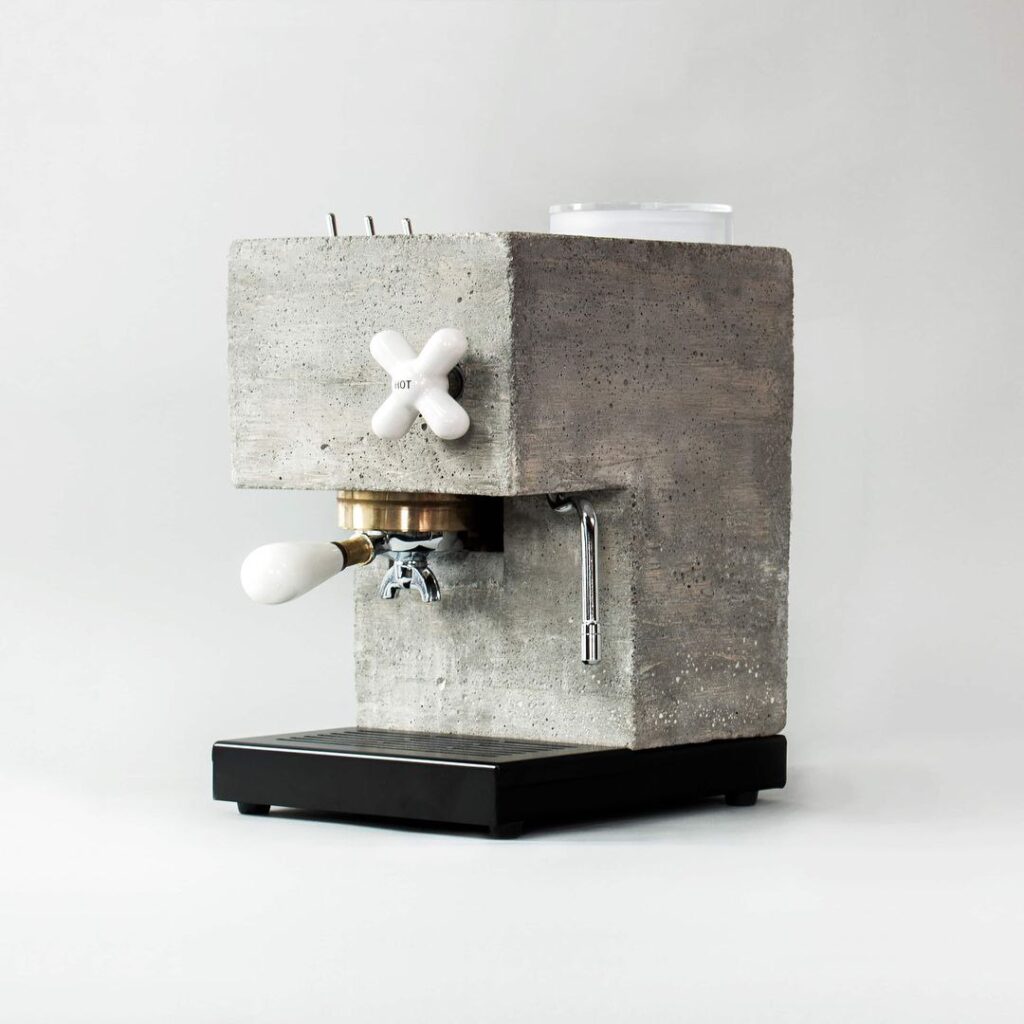
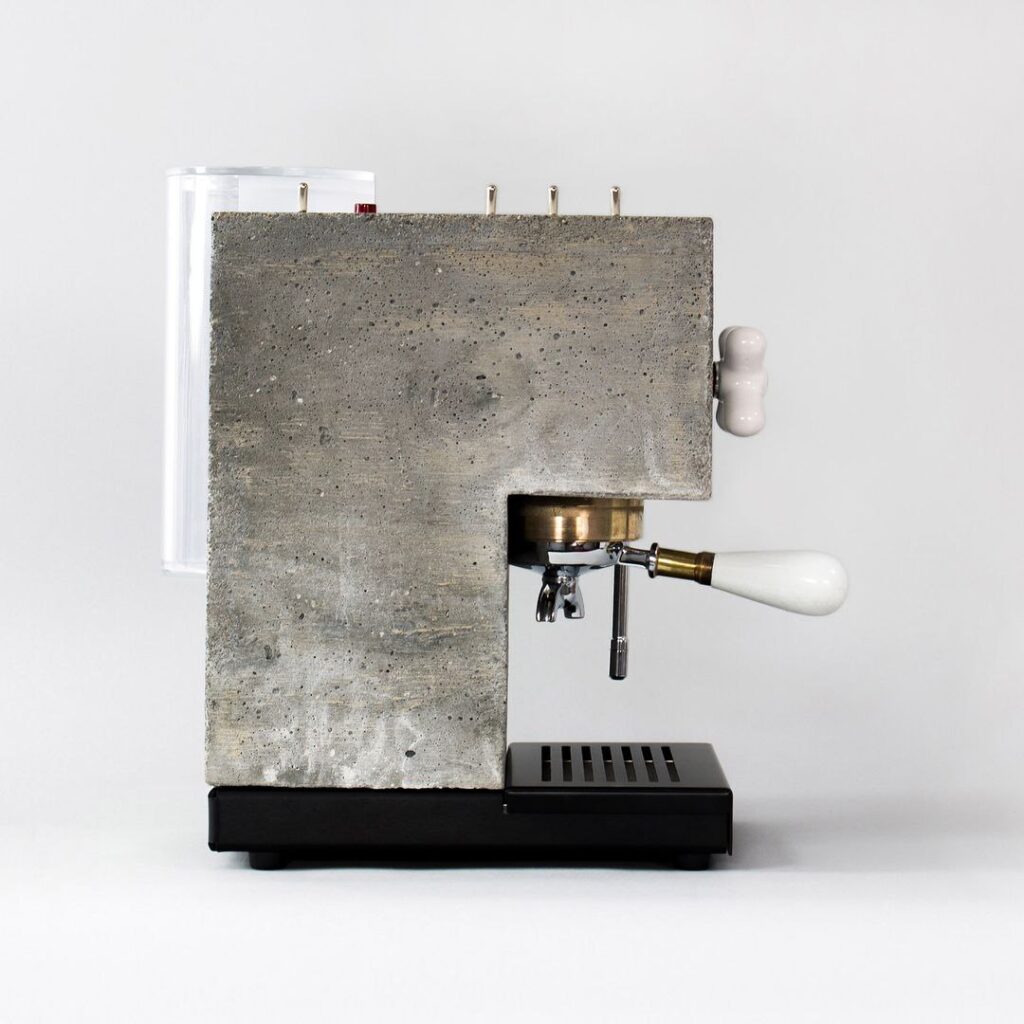
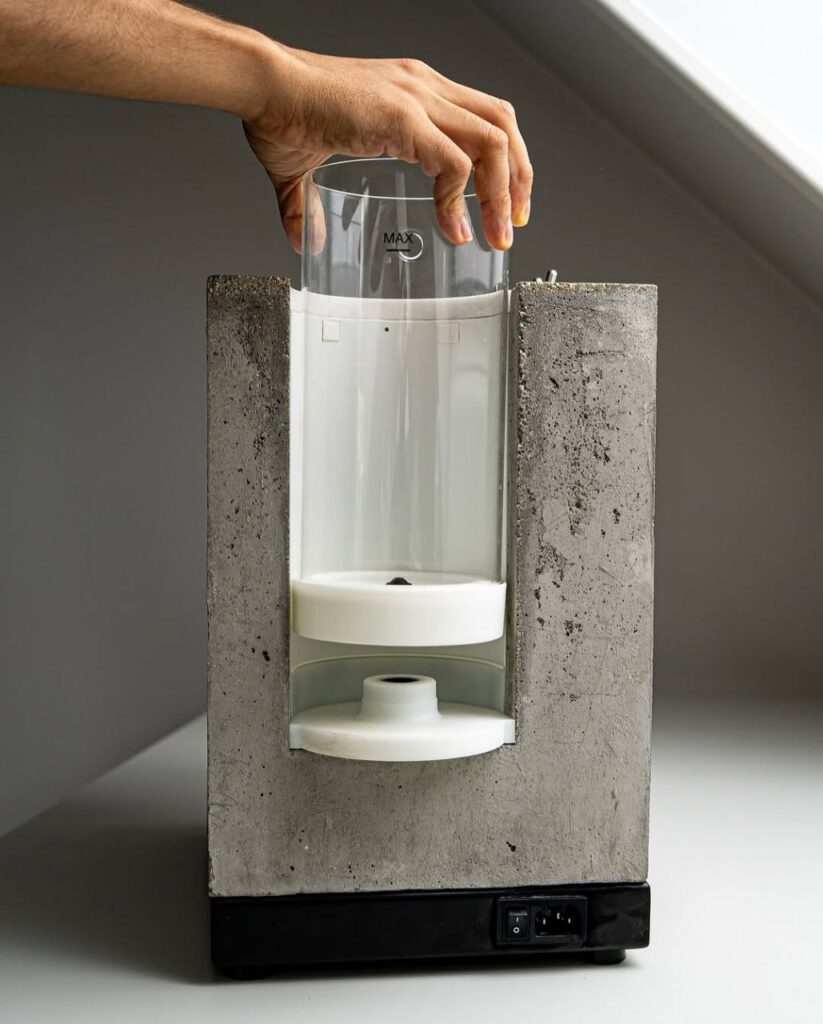
Performance: More Than Just Good Looks
But if it can’t make a good shot, looks don’t matter. And thank goodness, the AnZa works pretty well.
Quality of the Espresso
I was impressed from the first shot. The PID temperature control keeps the temperature stable, which is very important for extraction. The 58mm commercial portafilter gives you the same amount of resistance consistently, which lets you make a real espresso shot with rich crema and a balanced flavour.
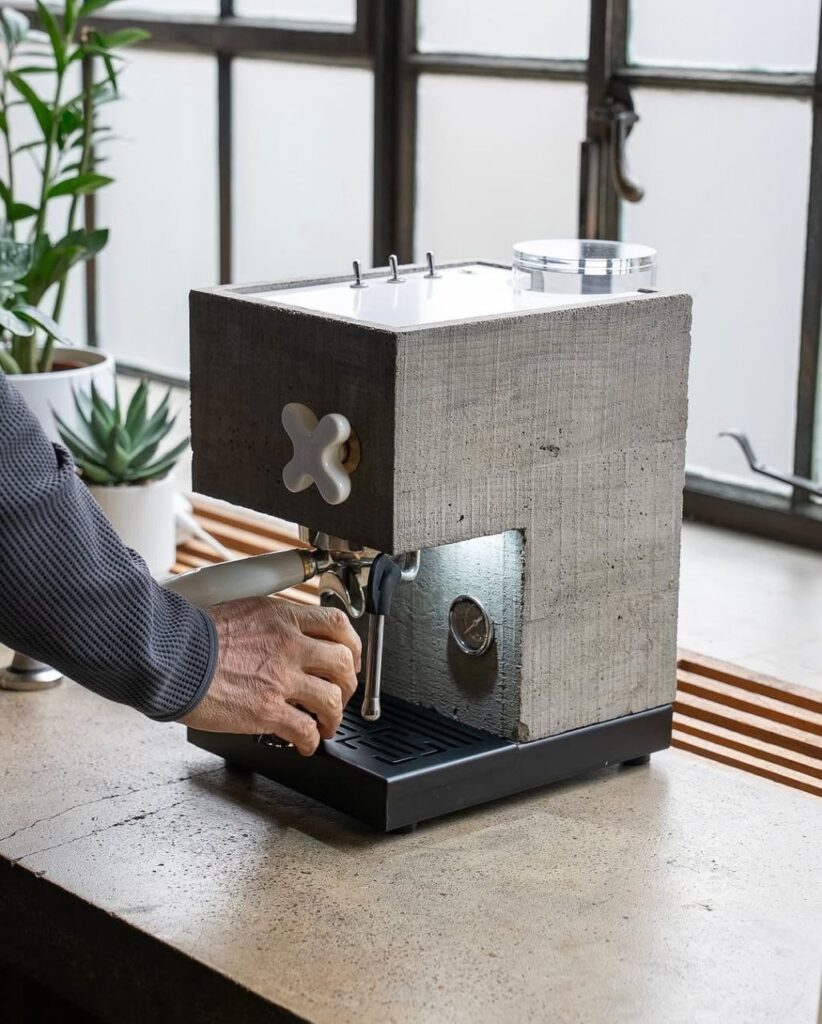
I used medium-roasted Ethiopian beans to test how clear the flavour was, and the results were very good. I could hear the delicate floral notes and citrus acidity that lower-end machines often drown out. The AnZa respects your beans and makes them better.
Power of the Steam Wand
The steam wand is strong enough to make milk into silky microfoam in about 20 to 30 seconds. It was easy for me to make beautiful latte art. This wand can make flat whites or cappuccinos at home that are just as good as at a cafe. (if you practise enough)
It doesn’t heat up as quickly as a dual boiler, but it does recover quickly and gives you a lot of steam pressure.
Usability and Workflow
This is a machine for the passionate user, not for someone who just wants to push a button and leave. Yes, there is a learning curve, but don’t worry it’s not difficult.
The manual toggles feel like they’re meant to be used. It’s easy to refill the removable water tank.
The drip tray, which is made of nicely finished wood, moves in and out easily.
It seems like every part of the AnZa was designed with a purpose.
Pros of AnZa Espresso Machine:
1) One of a Kind Look
Nothing else is like AnZa concrete espresso. The AnZa turns heads and breaks the mould, in a very real way. If you make espresso for a living, this machine is a part of who you are.
2) Quality of Construction
Brass, Concrete, and Porcelain? This thing is very strong. It seems more like hardware for building than kitchenware.
3) Quality of Commercial Espresso
It makes a shot of espresso that is always rich, full-bodied, and tasty. With the right settings, it can compete with shots from prosumer machines that cost $2,000 or more.
4) Handmade Design
There is a small difference in texture and finish between each unit. This isn’t something that came off an assembly line; it’s a piece of ‘hand finished design’.
Cons of AnZa Concrete Machine:
1) It’s Heavy and Big
This machine weighs more than 30 pounds, so you can’t move it around. It will stay there once it’s set up.
2) Limitations of a Single Boiler
You will have to wait a little while between brewing and steaming, just like with other single boiler machines. If speed is important to you, this isn’t a deal-breaker, but it’s something to think about.
3) Price Point
It costs more than $1,200, so it’s definitely a high-end investment. You are paying for both skill and performance.
4) No Grinder Included
You might think that for the price, there would be a built-in grinder, but there isn’t. To really get the most out of this machine, you’ll need a separate high-quality grinder.
Who Should Buy the AnZa Concrete?
This isn’t a machine that everyone can use, and that’s the point.
-> If you think of espresso as a ritual and like the way it feels to tamp, pull, steam, and sip.
-> If you care as much about how your kitchen looks as you do about the texture of the crema.
-> If you want a machine that “feels like it was built for you”.
Then you should go for the AnZa Concrete espresso machine.
Comparison: AnZa Concrete Vs Breville Barista Vs Rancilio Silvia Vs La Marzocco Linea Mini
| Feature/Model | AnZa Concrete R2 | Breville Barista Express | Rancilio Silvia | La Marzocco Linea Mini |
|---|---|---|---|---|
| Design Philosophy | Brutalist, Artistic, Raw Materials | Modern, User-Friendly, All-in-One | Classic Italian, Minimalist | Industrial, Commercial-Grade |
| Build Materials | Concrete, Brass, Wood, Porcelain | Brushed Stainless Steel, Plastic | Stainless Steel | High-grade Stainless Steel |
| Machine Type | Semi-Automatic | Semi-Automatic with Built-in Grinder | Semi-Automatic | Dual Boiler Semi-Professional |
| Boiler Type | Single Boiler with PID | Thermocoil | Single Boiler | Dual Boiler with PID |
| PID Temperature Control | Yes | No | (In newer Silvia Pro X models) | Yes |
| Portafilter Size | 58mm (Commercial) | 54mm (Pressurized/Non-Pressurized) | 58mm (Commercial) | 58mm (Commercial) |
| Steam Wand | Powerful Commercial-Style | Basic Panarello | Manual Steam Wand | Professional Grade |
| Water Tank Capacity | 2.0 Liters | 2.0 Liters | 2.0 Liters | 3.5 Liters |
| Ease of Use | Moderate – Manual Toggles | Beginner Friendly – Buttons & Dials | Intermediate – Needs Practice | Advanced – Professional Level |
| Espresso Quality | Barista-grade, Balanced Shots | Good, but grinder limits potential | Excellent with Practice | Outstanding, Café-Level Shots |
| Heat-Up Time | 5–7 Minutes | 1–2 Minutes | 5–7 Minutes | 10–15 Minutes |
| Size / Footprint | Compact but Heavy | Countertop Friendly | Compact | Large – Demands Space |
| Weight | ~30+ lbs (13.5+ kg) | ~23 lbs (10.4 kg) | ~30 lbs (13.6 kg) | ~71 lbs (32 kg) |
| Included Grinder | No | Built-in Conical Burr Grinder | No | No |
| Price Range (USD) | $1,300 to $1,900 | $750 to $800 | $850 to $1,000 | $5,900 to $6,500 |
| Built For Users | Design Enthusiasts, Passionate Home Baristas | Beginners to Intermediate Home Users | Intermediate Espresso Lovers | Prosumer, Small Cafés |
| Maintenance Level | Low to Moderate | Moderate (descaling & grinder care) | Moderate to High | High (Regular backflushing required) |
| Uniqueness Factor | Extremely Unique: Like Art on Your Counter | Common: Widely Used Entry Machine | Reliable Classic | Professional Legacy Machine |
Kevin’s Final Decision – Is It Worth It?
The answer is yes, with all my heart. The AnZa Concrete Espresso Machine is one of a kind in the world of espresso. I’ve looked at everything from old lever machines to new Italian wonders. It’s not that you find a machine that does both industrial design and serious espresso performance so well.
This is the machine for you if you want one that serves as art, if you want to take your time and appreciate the craft, and if you’re okay with spending money on something unique.
Questions and Answers:
1) Is it hard to clean the AnZa Concrete?
Not at all. It’s easy to clean the portafilter, drip tray, and steam wand. Just don’t get too much water on the concrete body, and make sure to often clean it with a damp cloth.
2) Can I use the AnZa with pods or capsules?
Nope. If you love freshly ground coffee, this machine is for you. You will need a burr grinder and whole beans to get the most out of it.
3) Is it easy for beginners to use?
It’s more for people who are already good at it, but beginners who are really interested will enjoy learning with it. Just know that the journey will be hands-on, not as easy as pushing a button.
4) How long does it take to get warm?
It takes about 5 to 7 minutes to warm up. Pretty normal for a good single boiler with PID.
5) Are there other materials that the AnZa can be made from?
Yes! There is also an AnZa White version made of Corian. This one looks more modern and sleek, which is great for people who don’t like concrete and prefer minimalism.
- Multi-Level Aroma G3 vs. P.A.G.2: Discover the Best Jura Grinder for Your Machine - December 6, 2025
- Best 5 Commercial Coffee Grinders for Cafes & Baristas - December 6, 2025
- Philips 4400 Review: LatteGo Espresso Machine | Comparisons Included - October 8, 2025


